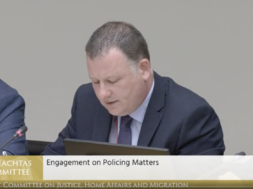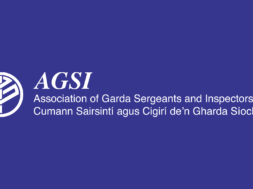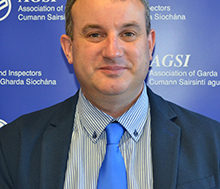“Independent Authority represents fundamental reform of policing oversight”
New Authority will:
· provide new independent forum for public oversight of policing services, with senior Garda management reporting to the Authority, including via public meetings
· drive reforms of policing system
· play an independent role in recommending and appointing senior Garda management
18 May, 2015
Frances Fitzgerald TD, Minister for Justice and Equality, has today published the Garda Síochána (Policing Authority and Miscellaneous Provisions) Bill 2015 which provides for the establishment of the new independent Policing Authority to oversee the performance of the policing functions of the Garda Síochána. The Bill has been approved by Government.
The Authority will have extensive functions, many of which are currently exercised by the Government or the Minister for Justice and Equality. In particular these functions will be concerned with overseeing the governance, structures and performance of the Garda Síochána in the policing area.
Minister Fitzgerald said: “The new Policing Authority is at the core of the Government’s justice reform programme. The establishment of an Independent Authority represents fundamental reform of policing oversight in Ireland. This is the most far reaching reform of An Garda Síochána since the foundation of the State.”
“The new Policing Authority will provide a new independent forum for the public oversight of policing services in Ireland. Senior Garda management will report to the Authority on the performance of policing services, including by way of quarterly public meetings”
“The new Authority will also provide a new engine to drive reforms of the policing system and practices to ensure that An Garda Síochána is fit to meet the ongoing and emerging challenges of 21st century policing.”
Minister Fitzgerald confirmed that the new Policing Authority “will play an important, independent role in recommending and appointing senior Garda management.”
The Authority will consist of a Chairperson and eight other members who will be appointed by the Government, following an independently-run selection process and the passage of resolutions approving their appointments by both Houses of the Oireachtas. Members of the Oireachtas or local authorities will not serve on the Authority. The Government has designated Ms. Josephine Feehily as the first Chairperson.
The Minister confirmed that the selection process for the eight ordinary members of the Authority will begin shortly, to be undertaken by the Public Appointments Service. This will allow the Authority to commence its operations as soon as possible after the Bill is enacted.
Chairperson-designate of the Policing Authority Ms. Josephine Feehily “welcomed the publication of the bill”. She added: “I look forward to the bill being enacted by the Oireachtas so we can move on to implementation and formal establishment of this important new Authority.”
The Bill provides that the Policing Authority will have responsibility for:
· Nominating persons for appointment by the Government to the posts of Garda Commissioner and Deputy Garda Commissioner;
· Appointing persons to the ranks of Garda Superintendent, Chief Superintendent and Assistant Commissioner (and removing them for reasons related to policing services);
· Appointing persons to senior positions within the Garda civilian staff;
· Determining Garda priorities in relation to policing services;
· Approving the 3 year Garda strategy statement;
· Approving the annual Garda policing plan;
· Establishing a Garda code of ethics; and
· Promoting and supporting the continuous improvement of policing in the State.
In the case of a number of Authority functions, the Bill requires the co-agreement of the Minister, in recognition of the constitutional position of the Executive.
National security is a vital function of Government. Under the new oversight arrangements it is proposed that the Garda Commissioner will report to the Policing Authority in respect of policing matters and to the Minister for Justice in relation to security matters.
The Bill enables the Authority to request the Garda Siochana Ombudsman Commission (GSOC) and/or the Garda Síochána Inspectorate to initiate an inspection or inquiry or to examine Garda practices or procedures.
The Authority will be accountable to the Public Accounts Committee and to other Committees of the Oireachtas.
The legislation has been developed taking into account the outcome of an extensive process of consultation. This included a seminar hosted by Minister Fitzgerald in Farmleigh on 20th June 2014 and the detailed consideration by the Joint Committee on Justice, Defence and Equality. Preparation of the Bill was also subject to detailed discussion by the Cabinet Committee on Justice Reform, chaired by An Taoiseach.
The Bill will be available on the Houses of the Oireachtas website: www.oireachtas.ie.
Minister Fitzgerald and Chairperson-designate Ms Josephine Feehily will be available for a media and photo opportunity at the Department of Justice offices at 51 St. Stephen’s Green at 11:15 this morning.
Ends…/
Note for Editors:
Background
The establishment of a Policing Authority is a key element of the Government’s programme of justice reform and was highlighted as a priority in the Statement of Government Priorities 2014 – 2016. A Cabinet Committee on Justice Reform, chaired by An Taoiseach, was established in April 2014 and has overseen the development of the legislative proposals for the new Authority.
The views of the public on the proposal to establish a new Authority were sought by way of a Government public consultation process that took place in May 2014. In addition, a consultation seminar on justice reform was hosted by the Minister for Justice and Equality on 20 June 2014 at Farmleigh House, attended by some 100 participants. The purpose of the seminar was to provide a platform for key stakeholders and persons with an interest in Garda reform to discuss elements of the Government justice reform programme.
Following a public consultation process and a number of hearings with interested parties, the Joint Oireachtas Committee on Justice, Defence and Equality published a report of its review of the Garda Síochána Act 2005 in October 2014. A number of the report’s recommendations relate to the establishment of a new Policing Authority and the Committee’s recommendations were taking into account in the drafting of the new Bill.
The provisions of the Bill are generally in line with the Scheme of a Bill published by the Minister in November 2014. The Joint Oireachtas Committee considered the Scheme, by way of pre-legislative scrutiny, and broadly welcomed its proposals.
Ms. Josephine Feehily has been nominated as the Chairperson-designate of the Authority. A selection process to be run by the Public Appointments Service will shortly commence for the purpose of nominating the other first members-designate of the Authority.
Functions of the Authority
The primary task of the Authority will be to oversee the performance by the Garda Síochána of its policing functions which will include:
· keeping under review the adequacy of the corporate governance arrangements and structures within the Garda Síochána;
· keeping under review the adequacy of the arrangements for the recruitment, training and development of Garda members and civilian staff;
· keeping under review the adequacy of the mechanisms in place within the Garda Síochána for the measurement of performance and accountability of Garda members and civilian staff;
· ensuring that the resources available to the Garda Síochána are used so as to achieve and maintain the highest levels of efficiency and effectiveness; and
· meetings between the Policing Authority and the Garda Commissioner some of which will be held in public and broadcast.
The Authority will also:
· recommend persons for appointment by the Government to the posts of Garda Commissioner and Deputy Garda Commissioner, following a selection process undertaken by the Public Appointments Service;
· appoint persons to the ranks of Garda superintendent, chief superintendent and Assistant Commissioner; and remove them for reasons related to policing services;
· appoint persons to senior positions within the Garda civilian staff;
· determine Garda priorities in relation to policing services;
· approve the annual policing plan;
· approve the 3 year Garda strategy statement;
· establish a Garda code of ethics; and
· promote and support the continuous improvement of policing in the State;
Main provisions of the Bill
The Bill comprehensively amends the Garda Síochána Act 2005 (“Principal Act”) to incorporate the Authority into the existing Garda legislative framework.
Part 1 contains the short title and commencement provisions as well as definitions and repeal provisions.
Section 4 contains a definition of “security services” which is required because the Authority will not have functions in relation to security services. The purpose of the definition is solely to identify the relevant functions of the Authority and it does not expand the existing Garda powers in the field of security. A specific exclusion is provided for lawful advocacy, protest or dissent. Where any question arises as to whether a particular matter relates to policing services or security services, the Minister will be the arbiter.
Section 5 sets out principles (“policing principles”) which will underpin the provision of policing services in the State.
Part 2 (sections 8 to 17) amends chapter 2 of Part 2 of the Principal Act relating to personnel and organisation of the Garda Síochána and gives the Authority a very significant role in the appointment of senior Garda personnel. In particular, the Government will make the appointments to the rank of Commissioner (section 8) and Deputy Commissioner (section 9) on the recommendation of the Authority. The Government will be obliged to accept the Authority’s recommendations but may, in exceptional circumstances and for substantial and stated reasons, request the Authority to nominate another person in respect of the appointment. The Authority will make appointments to the ranks from Garda superintendent to Assistant Commissioner. (section 12).
Section 10 amends section 11 of the Principal Act which sets out the processes for the removal of the Garda Commissioner, Deputy Garda Commissioners, Assistant Garda Commissioners, chief superintendents or superintendents. While the Government will retain the power to remove the Commissioner or a Deputy Commissioner the Authority will be able to recommend a removal from these positions on grounds relating to policing services. The Authority will also be able to remove an Assistant Commissioner, chief superintendent or superintendent on grounds relating to policing services. Sections 11 and 13 amend sections 12 and 13 of the Principal Act to take account of the role of the Authority in the removal of these senior officers.
Section 14 amends section 14 of the Principal Act to require the Garda Commissioner to obtain the consent of the Authority where he or she proposes to dismiss a member of the Garda Síochána not above the rank of inspector in accordance with that section.
Section 15 amends section 15 of the Principal Act to continue the current arrangements for recruitment of reserve members with a requirement for consultation with the Authority rather than the Minister, where appropriate.
Section 16 substitutes a new section 17 into the Principal Act to require the Authority to publish, within 12 months, a code of ethics for Garda members and civilian staff that includes standards of conduct and practice and encourages and facilitates the reporting of wrongdoing within the Garda Síochána.
Section 17 amends section 19 of the Principal Act to require approval for the appointment of Garda civilian staff to be given by the Authority. In addition, provision is made for the Authority to directly appoint Garda civilian staff equivalent to or above the rank of chief superintendent.
Part 3 amends chapter 3 of Part 2 of the Principal Act and sets out the roles that will be undertaken by the Minister, the Authority and the Garda Commissioner. The main provisions are set out below.
Section 18 amends section 20 of the Principal Act and requires the Authority, subject to the prior approval of the Minister, to determine, and from time to time revise, priorities and performance targets for the Garda Síochána in performing its functions relating to policing services. It also inserts a new section 20A into the Act to allow the Minister to set priorities and performance targets in relation to security services.
Section 19 amends section 21 of the Principal Act and requires the Authority, with the consent of the Minister, to approve the 3 year strategy statement for the Garda Síochána.
Section 20 amends section 22 of the Principal Act to require the Authority, with the consent of the Minister, to approve the annual Garda policing plan.
Section 23 amends section 25 of the Principal Act to enable the Minister, following Government approval, to issue a directive to the Authority in relation to policing services. It also allows the Authority to recommend to the Minister that a directive be issued to the Garda Commissioner in relation to policing services.
Section 24 modifies the functions of the Garda Commissioner, as set out in section 26 of the Principal Act, to reflect the relationship between the Garda Commissioner and the Authority in relation to policing services.
Section 26 amends section 32 of the Principal Act to facilitate the appointment by the Minister of an Assistant Garda Commissioner to perform the functions of the Garda Commissioner where the Commissioner or a Deputy Commissioner is not available.
Part 4 makes provision for amendments to sections 35, 36 and 38 of the Principal Act to transfer to the Authority the functions of the Minister in relation to Joint Policing Committees and the establishment of CCTV schemes for the purpose of securing public order.
Part 5 contains amendments to sections 40, 41, 42, 44, 45 and 46 of the Principal Act dealing with the accountability of the Garda Commissioner for the exercise of his or her functions. In particular, the amendment to section 40 provided for by section 32 specifies the reporting relationship between the Garda Commissioner and the Authority – the Commissioner will report to the Authority with regard to policing services.
Part 6 contains consequential amendments to sections 52, 53, 55, 56 and 62 of the Principal Act dealing with, amongst other things, the secondment of members of the Garda Síochána to service with the Police Service of Northern Ireland and vice versa.
Part 7 inserts a new Part 2A into the Principal Act to provide for the establishment of the Authority, its membership, functions and accountability to the Minister and the Oireachtas. The key provisions are as follows:
Section 62C provides that the Authority will comprise 9 members to be appointed by the Government. The chairperson will be appointed directly by the Government and the other 8 ordinary members will be appointed by the Government from a panel following the holding of a selection competition run by the PAS. A resolution of both Houses of the Oireachtas agreeing to the appointments will be required. The section also provides that the chairperson designate will become the first chairperson of the Authority. Additionally it makes provision for ordinary members designate of the Authority to be the first ordinary members of the Authority.
Section 62G provides for the removal by the Government of a member from the Authority following detailed and stringent procedures, including a resolution from both Houses of the Oireachtas;
Section 62H sets out the functions of the Authority – detailed above.
Section 62J requires the Authority to hold at least one meeting in public with the Garda Commissioner every 3 months and makes provision for attendance by the media and the broadcasting of such meetings.
Sections 62S and 62T provide for the Chief Executive of the Authority to account to the Public Accounts Committee in respect of the Authority’s expenditure and to other Committees of the Oireachtas in respect of general administrative matters. The sections will not affect or limit the capacity of an Oireachtas Committee to invite members of the Authority to appear before it.
Part 8 includes amendments to the provisions of the Principal Act relating to the Garda Síochána Ombudsman Commission (GSOC) and the Garda Síochána Inspectorate, to take account of the establishment of the Authority. The key amendments are set out below.
Section 45 amends section 67 of the Principal Act to require GSOC to promote mediation and informal resolution of appropriate complaints.
Section 48 amends section 102 of the Principal Act to enable the Authority to request GSOC to investigate any matter relating to policing services that gives rise to a concern that a member of the Garda Síochána may have committed an offence, or behaved in a manner that would justify disciplinary proceedings.
Section 49 amends section 102B of the Principal Act to enable the Authority, subject to the consent of the Minister, to request GSOC to investigate any behaviour of the Garda Commissioner in the context of his or her functions relating to policing services that leads it to believe that the Commissioner may have committed an offence or behaved in a manner that would constitute serious misconduct.
Section 52 substitutes a new section 106 into the Principal Act to allow the Authority to request GSOC to examine practices or procedures of the Garda Síochána in relation to policing services matters.
Section 53 amends section 117 of the Principal Act to enable the Authority to request the Garda Síochána Inspectorate to initiate an inspection or inquiry in relation to aspects of the operation and administration of the Garda Síochána pertaining to a matter relating to policing services.
Section 54 inserts a new section 117A into the Principal Act to enable the Minister to request the Authority to monitor the implementation by the Garda Síochána of recommendations of the Garda Síochána Inspectorate.
Part 9 contains miscellaneous provisions, including a provision at section 60 for a review, to commence not later than 5 years after the establishment of the Authority, of the operation of the amendments to be made by the Bill to the Principal Act in respect of the Authority.









